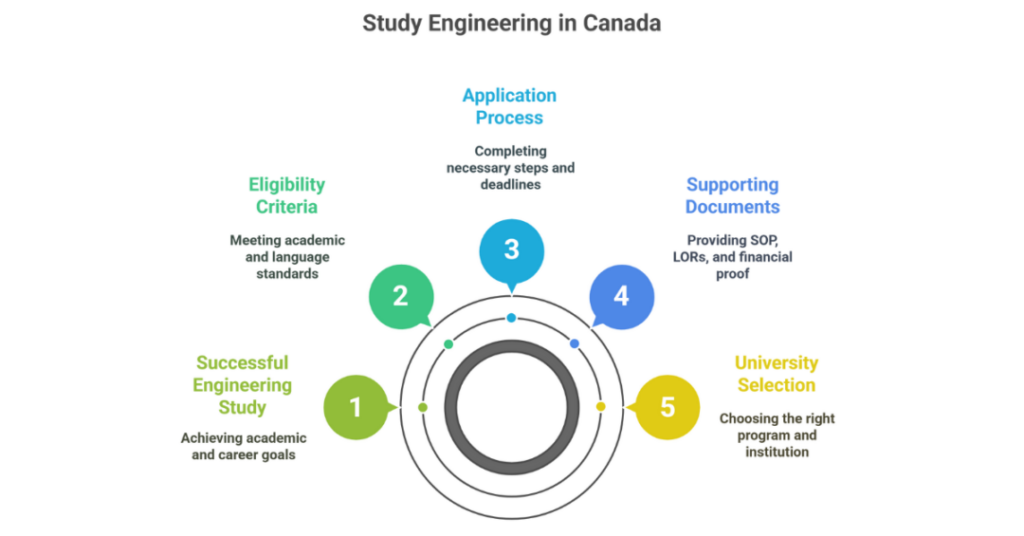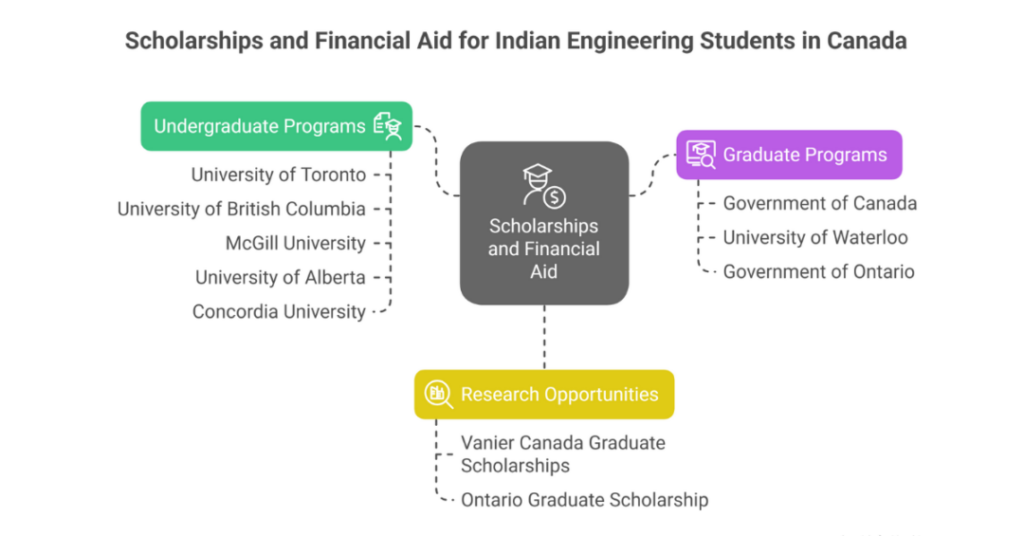17 June 2025
6 minutes read
How to Study Engineering in Canada as an Indian student?

Key Takeaways
- How to study engineering in Canada starts with choosing the right course, meeting eligibility, and planning your finances smartly.
- Canada offers top-ranked universities, diverse engineering specializations, and scholarships tailored for Indian students.
- Career opportunities after graduation are strong, especially in software, mechanical, and electrical engineering fields.
Over 35,000 Indian students head to Canada every year, yet most struggle to understand how to study engineering in Canada the right way. Between confusing eligibility criteria, high tuition fees for international students, and endless engineering specializations, it’s easy to feel overwhelmed.
Let’s be honest: choosing the wrong engineering course or university can cost you years and lakhs. But with clear guidance on programs, top engineering universities in Canada, and what Canadian universities actually offer, you can finally plan smarter and pursue engineering in Canada with confidence.
Why do Indian Students choose to Study Engineering in Canada?
Indian students choose to study engineering in Canada for its world-class education, diverse engineering programs, and globally ranked universities. From civil engineering to computer engineering, Canadian universities offer the best engineering specializations like aerospace, petroleum, biomedical, and software engineering.
Colleges in Canada provide hands-on experience, advanced study, and research opportunities. With flexible eligibility criteria, studying in Canada after 12th is easier than ever. Canada is among the top countries to study abroad and offers unmatched support for international students planning to pursue engineering.
10 Top Engineering Universities in Canada for Indian Students
Canada is one of the most preferred study destinations for Indian students planning to pursue engineering. Known for its top universities, advanced research, and globally recognized degrees, Canada offers a wide range of engineering programs in Canada from chemical engineering to mining engineering.
Whether you’re exploring bachelor of engineering in Canada or graduate programs in engineering, this table highlights the best options for those wondering how to study engineering in Canada.
| University | Popular Engineering Specializations Offered | Program Level | Tuition Fees (Per Year) | Why It’s Ideal for Indian Students |
|---|---|---|---|---|
| University of Toronto | Electrical Engineering, Chemical Engineering, Biomedical, Environmental | UG & PG | CAD 62,000 | Among the top universities in Canada with world-class research in Canadian engineering |
| University of British Columbia | Civil, Mechanical, Mining, Environmental Engineering | UG & PG | CAD 58,000 | Offers cutting-edge engineering programs in Canada and vibrant student life |
| McGill University | Mechanical, Software, Chemical, Mining | UG & PG | CAD 52,000 | One of the best universities globally; strong in engineering education |
| University of Waterloo | Computer, Electrical, Mechatronics, Industrial | UG & PG | CAD 53,000 | Offers top engineering co-op programs; great industry exposure |
| University of Alberta | Petroleum, Mining, Chemical, Agricultural Engineering | UG & PG | CAD 42,000 | Specialized in energy-sector engineering and graduate research |
| McMaster University | Biomedical, Civil, Electrical, Mechanical Engineering | UG & PG | CAD 48,000 | Strong in biomedical engineering and experiential learning |
| Queen’s University | Civil, Mechanical, Mining, Electrical | UG & PG | CAD 47,000 | Among top engineering colleges in Canada; excellent research facilities |
| University of Calgary | Petroleum, Civil, Software, Electrical, and aerospace engineering | UG & PG | CAD 43,000 | Located in Canada’s oil capital; great for petroleum engineering |
| Western University | Environmental, Biomedical, Mechanical, Chemical | UG & PG | CAD 44,000 | Known for interdisciplinary engineering programs and global recognition |
| Concordia University | Civil, Computer, Electrical, Industrial Engineering | UG & PG | CAD 30,000 | Affordable engineering course in Canada with strong international student support |
These universities and colleges provide not just education but also real-world learning to help solve engineering problems using applied sciences. Indian students can choose various engineering specializations, meet the eligibility criteria to study, and benefit from engineering colleges in Canada that rank among the top in the world.
Eligibility Criteria and Application Process to Study an Engineering Degree in Canada for Indian Students
If you’re planning to study abroad and wondering how to study engineering in Canada, understanding the eligibility and application process is your first step. With some of the best universities in the world, Canada is known for offering practical, research-driven engineering courses with high global demand.

Whether it’s mechanical, civil, or biomedical, Indian students have access to countless opportunities for engineering students through top colleges and universities.
1. Academic Qualifications
To apply for an engineering course in Canada, Indian students must have completed 12th grade with Physics, Chemistry, and Mathematics. For master’s, a bachelor’s in engineering with a strong GPA is required.
2. English Language Proficiency
As Canada is for international students, IELTS or TOEFL scores are mandatory. Most universities in Canada for engineering require an IELTS band of 6.5–7.0 or equivalent TOEFL score.
3. Entrance Exams (if required)
While most colleges in Canada offer direct admissions, some best universities might ask for GRE (for PG) or other standardized tests depending on the engineering specializations offered in Canada.
4. Statement of Purpose and Letters of Recommendation
When you apply for engineering in Canada, you’ll need to submit a compelling Statement of Purpose (SOP) explaining your passion, reasons to study engineering, and long-term goals, along with 2-3 academic or professional Letters of Recommendation (LORs).
5. Application Submission and Deadlines
Each course in Canada has its own application window. You must apply 6–12 months before the intake. Use official university portals or centralized platforms like OUAC for Ontario-based universities.
6. Proof of Funds and Visa Documents
Studying abroad allows international students access to quality education, but you must prove you can cover your tuition fees and cost of living. This is crucial for a Canadian student visa.
7. Selecting the Right Specialization
From petroleum to environmental engineering, colleges and universities provide a wide range of specializations for engineering in Canada. Pick one based on your career goals and future trends.
8. Research-Focused Universities
Canadian engineering education is deeply rooted in research. Many universities provide access to labs, innovation centers, and internships, helping students truly learn how to solve engineering challenges.
9. Diverse Degree Options
There are many types of engineering degrees—BEng, BASc, MEng, MASc. Each varies in course structure, research emphasis, and job outcomes. Students to pursue engineering must choose accordingly.
Cost of Living in Canada for Engineering International Students
When exploring how to study engineering in Canada, understanding the cost of living is just as important as choosing the right university. While Canada is one of the engineering and education hubs among international students, expenses can vary based on the city, lifestyle, and accommodation.
Whether you’re pursuing a bachelor’s or master’s across different types of engineering degrees, budgeting well ensures you make the most of your student journey in Canada for international students.
| Expense Category | Monthly Cost (CAD) | Description |
|---|---|---|
| Accommodation | 600 – 1,200 | Varies based on on-campus, shared, or private rental options |
| Food and Groceries | 250 – 400 | Includes daily essentials, groceries, and occasional dining out |
| Transportation | 80 – 120 | Public transport (buses, subways); student discounts may apply |
| Health Insurance | 60 – 100 | Mandatory for international students; may be included in tuition |
| Utilities & Internet | 100 – 150 | Electricity, water, heating, internet, mobile plans |
| Books & Supplies | 50 – 100 | Textbooks and study materials for different types of engineering degrees |
| Entertainment & Misc. | 100 – 200 | Recreation, personal care, emergency costs |
In total, international engineering students should budget approximately CAD 1,200 to 2,000 per month. Planning ahead helps ease your financial stress so you can focus on your goals while studying in Canada.
Scholarships and Financial Aid for Indian Engineering Students
Studying at the best engineering universities in Canada can be expensive, but financial support is available for Indian students. Whether you’re applying for a bachelor of engineering degree, a graduate study program, or engaging in engineering research, many Canadian institutions, including universities of applied sciences, offer scholarships for international students to reduce your financial burden.

Here’s a table that highlights major funding opportunities to help you understand how to study engineering in Canada affordably.
| Scholarship Name | Offered By | Applicable Level | Coverage | Who It’s For |
|---|---|---|---|---|
| Vanier Canada Graduate Scholarships | Government of Canada | Graduate/PhD | CAD 50,000/year for 3 years | Indian students pursuing engineering research at top universities |
| University of Toronto International Scholars Award | University of Toronto | Undergraduate | Up to CAD 100,000 over 4 years | High-achieving Indian students enrolled in a bachelor of engineering degree |
| UBC International Major Entrance Scholarship (IMES) | University of British Columbia | Undergraduate | CAD 25,000/year | Indian students accepted to UBC’s engineering study program |
| McGill Entrance Scholarships | McGill University | Undergraduate | CAD 3,000–10,000 | For academically outstanding Indian students in engineering |
| University of Alberta International Admission Scholarship | University of Alberta | Undergraduate | CAD 5,000 | For Indian students entering engineering programs at one of the best engineering universities in Canada |
| Ontario Graduate Scholarship (OGS) | Government of Ontario & Participating Universities | Graduate (Master’s/PhD) | CAD 15,000/year | Indian students in research-based engineering programs |
| Concordia Presidential Scholarship | Concordia University (University of Applied Sciences) | Undergraduate | Full tuition, books, and living expenses | Awarded to top international students, including Indians |
| Waterloo International Master’s Award of Excellence (IMAE) | University of Waterloo | Master’s | CAD 2,500/term | For Indian students in a full-time engineering graduate study program |
Career Opportunities for Engineering Graduates in Canada
Once you understand how to study engineering in Canada, the next big question is: what comes after graduation? Fortunately, Canada offers strong job prospects for engineering graduates across various sectors.
Here’s a look at some of the top career paths, along with average starting salaries, to help you plan your future.
| Job Title | Average Starting Salary (CAD/year) | Job Outlook | Work Permit Eligibility |
|---|---|---|---|
| Mechanical Engineer | 60,000 – 70,000 | High | Yes (Post-Graduation Work Permit) |
| Electrical Engineer | 65,000 – 75,000 | High | Yes |
| Civil Engineer | 58,000 – 68,000 | Moderate | Yes |
| Software Engineer | 70,000 – 85,000 | Very High | Yes |
| Biomedical Engineer | 60,000 – 72,000 | Moderate | Yes |
| Project Engineer | 65,000 – 78,000 | High | Yes |
| Quality Assurance Engineer | 55,000 – 65,000 | Growing | Yes |
| Environmental Engineer | 60,000 – 70,000 | Moderate | Yes |
Conclusion
Mastering how to study engineering in Canada starts with the right information, but succeeding depends on how well you plan your journey, from choosing universities to building a strong profile.
If you’re serious about your dream to study in Canada, don’t leave it to chance. Let Ambitio help you craft a standout profile and land at your dream university.
From selecting the right engineering program to optimizing your SOPs and CV, we do it all, with expert mentoring, tools, and real results.
FAQs
What are the basic eligibility requirements to study engineering in Canada?
You generally need to complete high school with strong grades in math, physics, and chemistry, and meet English language proficiency requirements like IELTS or TOEFL.
How do I apply to engineering programs in Canadian universities?
Choose your preferred university and program, submit an online application with transcripts and required documents, and pay the application fee.
What degrees are offered for engineering in Canada?
Canadian institutions offer Bachelor’s, Master’s, Doctoral, and diploma engineering programs across various specializations.
How much does it cost to study engineering in Canada?
Tuition fees range from CAD 11,000 to 62,250 per year for undergraduate programs, and CAD 7,100 to 45,000 per year for graduate studies, depending on the university and program.
Can international students work while studying engineering in Canada?
Yes, international students can work part-time during their studies and full-time during scheduled breaks, as per their study permit conditions.
What are the top universities for engineering in Canada?
Leading universities include the University of Toronto, University of British Columbia, McGill University, University of Alberta, and University of Waterloo.
How do I become a licensed engineer after graduating in Canada?
After earning your degree, you must gain supervised work experience, pass a professional ethics exam, and apply for licensure with the provincial engineering regulatory body to become a professional engineer.

You can study at top universities worldwide!
Get expert tips and tricks to get into top universities with a free expert session.
Book Your Free 30-Minute Session Now! Book a call now




























